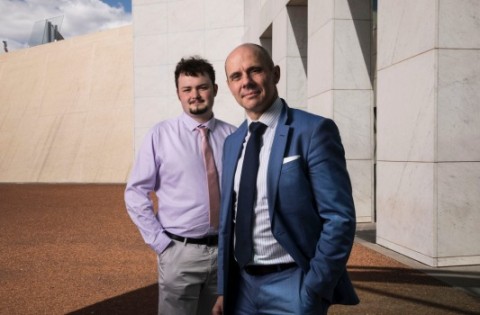
IT services company DXC Technology is making headway in plugging the tech skills gap by tapping into a talent pool often neglected by employers, hiring people on the autism spectrum.
Since 2015, the New York Stock Exchange-listed company that employs 10,000 people in Australia has been running a three-year training project called the Dandelion Programme and has hired 80 people to take on a variety of tech roles.
DXC Technology Australia and New Zealand managing director Seelan Nayagam told The Australian Financial Review the program had been particularly successful in helping young people on the spectrum take on jobs in cyber security, data analytics and software testing.
"Thinking about the tech industry and where it's going, the number one issue is the skills shortage. What you see here is the ability to tap into a workforce that has incredible skills for certain work around cyber security, testing and analytics and it opens up a pool of candidates that are looking to contribute ... and have a meaningful job," he said.
"There are a number of participants that now have meaningful jobs, a meaningful salary and can start their own families. It's rewarding for DXC,
While the participants are employed by DXC, the program only works in conjunction with a group of its clients, who have the Dandelion Programme participants take on work in their organisations and are willing to make the work environment comfortable for them.
Some of the major supporters of DXC's program have been ANZ Bank, the department of defence, the department of home affairs and the department of human services.
The three-year program gives participants tech skills, but it helps them with interpersonal skills, financial literacy and general life skills.
The success of the Dandelion Programme has inspired DXC to form division of the company called Social Impact Practice, which will help its clients replicate the success of the project, as well as developing further programs to assist those with attention deficit/hyperactivity disorder and learning disabilities.
"The material we've created has been downloaded by 220 organisations and we've been surprised by the broader impact we've had and how it's being amplified," DXC Dandelion Program executive Michael Fieldhouse said.
"So we're looking at how we can help other clients develop a purpose and impact their day-to-day business."
Initiative a success
ANZ operations expert Andrew Baird said the company had taken on nine people with autism about eight months ago and the initiative had been a success.
"We developed a training program for ANZ employees and teams who would be working with the people on the autism spectrum focused on dispelling some preconceptions about autistic people and their traits so that they were comfortable interacting with each other," he said.
"We have an online e-training portal available to all staff globally, and then we conduct more classroom style face-to-face sessions with a specialist consultant that we have on board."
ANZ is hoping to take on more young people on the spectrum in the coming years. When they first start working at the company, they work in a designated pod with each other, but in eight months three individuals are now working within ANZ teams.
"What we've found is that in some situations their speed of learning and ability to pick up tools and processes is much faster. They have also been 50 per cent more productive in some parts of work," Mr Baird said.
Greater confidence
Brendan Murray, a young man in his early 20s, has been working as a trainee test analyst for the last 19 months thanks to the Dandelion Programme. He had been unemployed since the end of year 12, but was selected to be part of DXC's initiative and he says it made him more confident in taking on a career.
"I found it to be a comfortable program to really work within. I appreciate the support it's given the people in the Dandelion Program ... and it's a great path to find permanent employment," he said.
Currently positioned in a government department he jokes that he just pushes the right buttons on the computer all day, but it has inspired him to encourage his two younger brothers who are also on the autism spectrum to try and get into the IT industry.
"I would like to continue to work in the IT industry and hopefully one day become a team leader and then continue to progress up the management chain," he said.